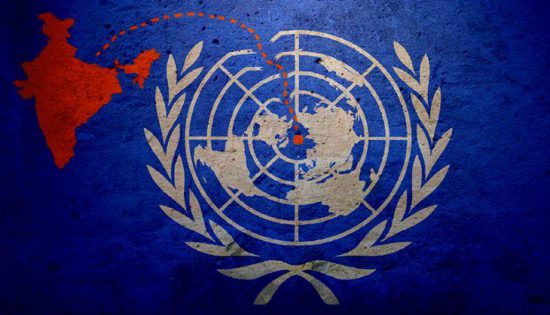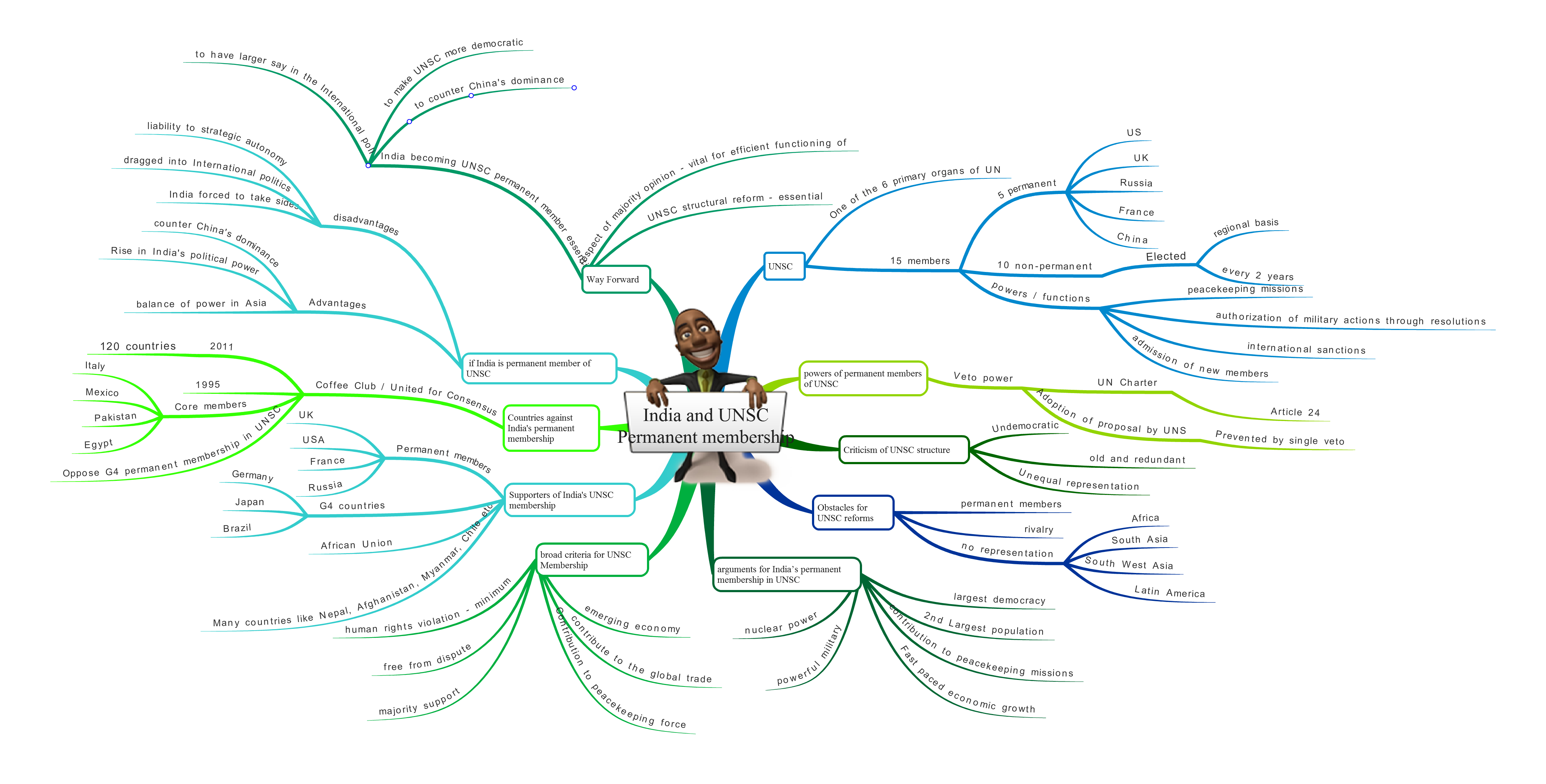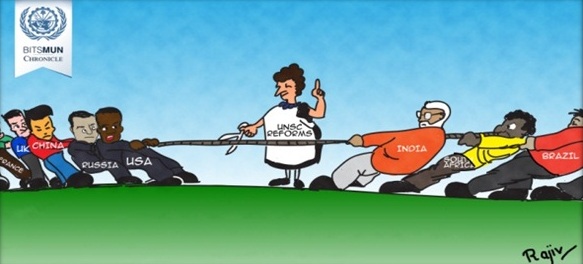India & UN Security Council (UNSC) Reforms – Explained

United Nations Security Council is argued to be not in par with the current geopolitical scenario. Since its establishment in 1945, there has been little to no change in its structure.
Many countries including India are bidding for permanent membership in this organisation. This allows them to carry out their national interests, boost their political power in the global arena and create a balance of power in the multipolar world.
However, there has been little progress in this regard due to the rigid stance taken by the 5 permanent members who are unwilling to reduce their power status and also power rivalry amongst nations.
This topic of “India & UN Security Council (UNSC) Reforms – Explained” is important from the perspective of the UPSC IAS Examination, which falls under General Studies Portion.
What is the UN Security Council?
- UN Security Council is one among the 6 primary organs of the United Nations.
- It consists of fifteen members. Among these members, five nations hold permanent membership within this organisation. They are the US, UK, Russia, France, and China. These countries hold this position as they emerged victorious during World War II. The rest of the 10 members of the UNSC are non-permanent members. They are elected on a regional basis in every 2 years.
- Its powers include the establishment of peacekeeping missions, international sanctions, authorization of military actions through resolutions, recommends the admission of new members, etc.
What makes the permanent membership in UNSC very powerful?
- The permanent members have veto power.
- According to Article 24 of the UN Charter, the UNSC decisions require affirmative votes on 9 members. However, the adoption of a proposal can be prevented by the UN permanent member by casting a veto, even if there were required number of votes for the same.
- The veto power is criticized for its undemocratic nature. A single veto can prevent the execution of the majority’s decisions in the UN Security Council.
- The permanent members have made use of this power to fulfill their national interest.
- For example, Russia made use of its veto power to prevent the resolution of the condemnation of the invasion of Crimea.
- Taiwan is not a member of the UN because of China’s veto power.
What are the criticisms of the current structure of the UNSC?
- Undemocratic: The majority of views are undermined as a single veto by a permanent member is enough to hinder the adoption of the majority’s resolution.
- Not in par with current times: In 1945, the permanent membership was selected based on the result of World War II. There has been no change in the structure of permanent membership till now.
- Unequal representation: Many states remain either unrepresented or underrepresented. For example, West Asia, Africa, and Latin America have no representation in the UNSC. Europe, on the other hand, is overrepresented. Asia is under the hegemony of China. The restructuring of UNSC is vital to maintain peace and prosperity of the world.
What are the obstacles for UNSC reforms?
- The permanent members: The permanent members are not willing to reduce their power status. Therefore they are not willing to give up the current structure.
- Opposition by the adversaries: China is not willing to give Japan the permanent membership in UNSC. Italy opposes Germany’s bid for permanent membership. Pakistan hinders the progress of India’s bid for UNSC permanent membership and Argentina is against Brazil’s attempt to represent Latin America as a permanent member of UNSC.
- Lack of representation: The lack of unity amongst the African nations, Latin American Nations, West Asian Nations, etc., hinders any form of representation of the continent.
What are the arguments for India’s permanent membership in UNSC?
- 2nd largest population in the world: India has the second-largest population in the world after China. Ironically, it remains unrepresented in the UN.
- One of the oldest democracies: India is the largest democratic nation in the world. Its democratic ideology will help promote free and fair representation in the UN.
- Contribution to peacekeeping mission: India is one of the largest contributors of troops to the UN Peacekeeping missions. Currently, according to Foreign Policy Magazine, India has about 8,500 troops in the peacekeeping force. This is twice as many as all the permanent members combined.
- Economic Growth: India is one of the fastest-growing economies in the world. It is the fifth-largest economy by nominal GDP and stands third by purchasing power parity.
- Armed Forces: India holds the second-largest armed force after China.
- Nuclear Power: All permanent members hold nuclear weapons. India too has nuclear weapon making it a nuclear power. With India’s no first use policy, its permanent membership will provide further deterrence with regards to the nuclear threat.
What are the broad criteria for UNSC Membership?
- The nation must be an emerging economy. It must contribute to global trade.
- Human Rights Violation must be at a minimum.
- It must be free from disputes with other countries.
- The nation must contribute to the UN peacekeeping force.
- The majority must pass the bidding for the UNSC membership.
Which are all the countries that support India’s bid for permanent membership in UNSC?
- Four of the five permanent members are openly backing India’s bid for permanent membership. This includes France, US, UK, and Russia.
- India, being a part of G4 alliance, is supported by Japan, Brazil, and Germany. The G4 nations support each other for UNSC Permanent membership along with two African Nations.
- African Union as a whole supports India’s permanent membership.
- Many other countries like Nepal, Afghanistan, Chile, Greece, Bhutan, Myanmar, Malaysia, etc., are explicitly supporting India’s bid for permanent membership.
Who are against India’s bid for permanent membership in UNSC?
- In 1995, the Italian Ambassador Fulci along with Pakistan, Mexico, and Egypt found the “Coffee Club” or United for Consensus to oppose the proposal for an increase of the permanent membership of the UNSC. This was formed in response to the formation of G4 Nations. The G4 nations include India, Japan, Germany, and Brazil.
- As of 2011, there are about 120 member states that oppose the G4 permanent membership in UNSC.
What are the Advantages faced by India if it is made a permanent member of UNSC?
- Counter Chinese dominance: India can, to a certain extent, counter China’s dominance in Asia.
- Rise in Political power status: India will be able to raise its global political power status. If the permanent membership is given, India will be able to implement policies based on the national interest.
What are the drawbacks if India is made a permanent member of UNSC?
- India must take sides on certain internationally critical issues like Israel and Palestine. This would undermine India’s Strategic Autonomy and flexibility.
- India may be dragged into international politics that may cause a negative impact on India’s national interest.
- Even with the veto power, it will be difficult to counter China’s dominance in the region.
Way Forward:
- UN Security Council is an essential organ of the UN. Without reforms in its structure, the United Nations is at the risk of becoming redundant.
- Majority opinions of the nations must be given top priority instead of the selfish national interests of the 5 powerful nations.
- Equal representation of all the countries across the world is essential to maintain international peace and security.
- Many countries are bidding to become permanent members of the UN. Among these countries, India is the top contender.
- India becoming a permanent UNSC member is essential for maintaining a balance of power with China and countering China’s hegemony within Asia.
Article by: K.G.Karishma






Make it audio enabled